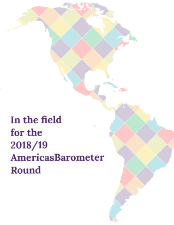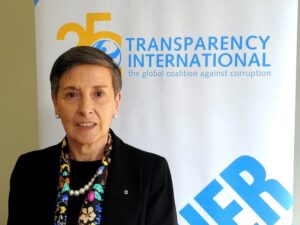Latin American democracy was already vulnerable before the pandemic due to crises of trust, legitimacy and representation, corruption, and the overall mixed results of the political system for citizens, according to an Inter-American Dialogue webinar (above) on “Democracy in a Post-Pandemic Latin America,” co-hosted with Luminate. and featuring analysis from Journal of Democracy contributor Arturo Valenzuela.
 The perceived mismanagement of the pandemic has served to exacerbate these pre-existing concerns. Based on this context, Felipe Estefan, Latin America director and head of the DC office at Luminate, highlighted four key findings of his group’s public opinion research:
The perceived mismanagement of the pandemic has served to exacerbate these pre-existing concerns. Based on this context, Felipe Estefan, Latin America director and head of the DC office at Luminate, highlighted four key findings of his group’s public opinion research:
- The first is the overall decline in favorability toward democracy, especially among youths between the ages of 16 to 24. Estefan hypothesized that this outcome is a product of that age group not having experienced authoritarian regimes and instead, living through democracies that have achieved mixed results.
- Secondly, responses from Argentina, Mexico, and Colombia gave poor marks to their leaders for the handling of the pandemic and signaled that they would hypothetically not reelect incumbents for a second term (only applicable to Argentina and Mexico). Brazil’s president experienced a rise in popularity, which Estefan attributed to the implementation of a cash-transfer program.
- Thirdly, citizens in all surveyed states responded with low trust in sources of information, including traditional news media and scientists. This is a troubling trend given the current need for well-informed citizens in the midst of a public health emergency.
- Finally, Estefan pointed to the overall rise in support for the right to protest against sitting governments. Reflecting on these results Estefan emphasized the need for “a broad reimagining of democracy, and to reimagine democracy we need to actually engage youth in a conversation in which they think not on how they would replace democracy but how they can actually build the kind of democracy they deserve.”
 Today sees the launch of a new book, ′′The Devil is in the Details: Referendums and Political Power in Latin America,” coordinated by political scientists Fernando Tuesta Soldevilla and Yanina Welp. This discusses recent referendums, such as Bolivia and Colombia (2016), and Ecuador and Peru (2018) as well as less-explored cases, such as Panama and Mexico; and the campaigns and the activation process of popular consultations, especially in Uruguay, Costa Rica and Venezuela (the latter in a chapter written by Miriam Kornblith, Latin America Director of the National Endowment for Democracy (NED). Watch the livestream launch discussion here.
Today sees the launch of a new book, ′′The Devil is in the Details: Referendums and Political Power in Latin America,” coordinated by political scientists Fernando Tuesta Soldevilla and Yanina Welp. This discusses recent referendums, such as Bolivia and Colombia (2016), and Ecuador and Peru (2018) as well as less-explored cases, such as Panama and Mexico; and the campaigns and the activation process of popular consultations, especially in Uruguay, Costa Rica and Venezuela (the latter in a chapter written by Miriam Kornblith, Latin America Director of the National Endowment for Democracy (NED). Watch the livestream launch discussion here.
In Latin America, where democracy is on the ropes, what’s needed is a new approach that transforms the traditional U.S. promotion of democracy and incorporates Latin American nations into the broader global foreign policy agenda, argues Shannon O’Neil, a senior fellow for Latin America Studies at the Council on Foreign Relations. The new administration in Washington “should come out of the gates with plans to shore up a values-based foreign policy,” O’Neill writes for Bloomberg. “Programs will have to return to basics, helping to rebuild a scaffolding of government, civil society and the investigatory press to restore the ground lost in recent years.”
 Systemic corruption represents one of the gravest threats to democracy worldwide – undermining representative institutions, corroding the rule of law and decimating public trust. In recognition of International Anti-corruption Day, the International Republican Institute’s Program Manager Rocio Martinez interviewed Dr. Delia Ferreira (left), Chair of Transparency International, on the sustainability of social movements against corruption, as well as challenges, trends and best practices in combating kleptocracy in Latin America.
Systemic corruption represents one of the gravest threats to democracy worldwide – undermining representative institutions, corroding the rule of law and decimating public trust. In recognition of International Anti-corruption Day, the International Republican Institute’s Program Manager Rocio Martinez interviewed Dr. Delia Ferreira (left), Chair of Transparency International, on the sustainability of social movements against corruption, as well as challenges, trends and best practices in combating kleptocracy in Latin America.
The IAD webinar featured moderation from Michael Camilleri, director of the Peter D. Bell Rule of Law Program at the Inter-American Dialogue, and analysis from Journal of Democracy contributor Arturo Valenzuela, emeritus professor of Government and International Relations at Georgetown University, Ilona Szabó, co-founder and president of the Igarapé Institute, Felipe Estefan, Latin America director and head of the DC office at Luminate, and Laura Zommer, executive director and editor-in-chief at Chequeado. RTWT
Challenges and Opportunities to Combat Anti-Corruption in Latin America https://t.co/YBskLOiJvw via @IRIglobal
— Democracy Digest (@demdigest) December 9, 2020







